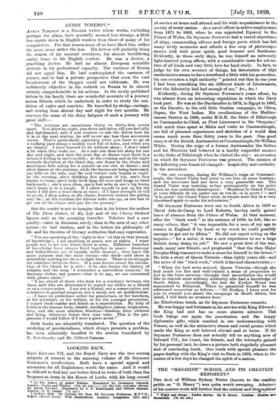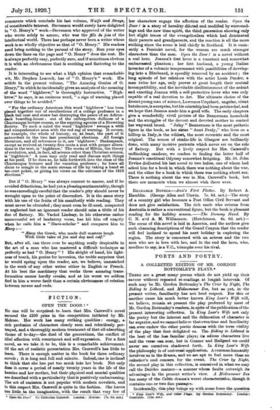THE "MAGAZINE" !SCHOOL -AND ITS GREATEST :EXPONENT : 4 ' THE desk
of 'William Sydney -Porter (known to -the .reading public An " 0: Henry ") was quite worth 'sweeping. Admirers of his maturemorkwill further find-the-critical and bieiraphioal • Wolfs and Strays : Tombs Stories. By O. Henry. :London : Hodder sad Stoughton. [76. ed. net.]
comments which conclude his last volume, Waifs and Strays, of considerable interest. Stevenson would surely have delighted in " O. Henry's " work—Stevenson who approved of the writer who wrote solely to amuse, who was the fills de joie of the intellectual world. There has perhaps never been a writer whose work is so wholly objective as that of "O. Henry." His readers need bring nothing to the perusal of the story. Run your eyes down the lines on the page and " O. Henry " does the rest. He is always perfectly easy, perfectly sure, and if sometimes obvious it is with an obviousness that is soothing and flattering to the reader.
It is interesting to see what a high opinion that remarkable wit, Mr. Stephen Leacock, has of " 0. Henry's " work. His article in the present volume, " The Amazing Genius of 0. Henry," in which he incidentally gives an analysis of the meaning of the word " highbrow," is thoroughly instructive. " High- brow," he says, is an ominous word, " a sign of warning placed over things to be avoided."
" For the ordinary American this word ' highbrow ' has been pieced together out of recollections of a college professor in a black tail coat and straw hat destroying the peace of an Adiron- dack boarding-house : out of the unforgotten dullness of a Chautauqua lecture course, or the expiring agonies of a Browning Society. To such a mind the word ' highbrow ' sweeps a wide and comprehensive area with the red rag of warning. It covers, for example, the whole of history, or, at least, the part of it antecedent to the two last presidential elections. All foreign literature, and all references to it, are highbrow.' Shakespeare, except as revived at twenty-five cents a seat with proper altera- tions in the text, is highbrow.' The works of Milton, the theory of evolution, and, in fact, all science other than Christian science, is ' highbrow.' A man may only read and discuss such things at his peril. If he does so, he falls forthwith into the class of the Chautauqua lecturer and the vacation professor ; he loses all claim to mingle in the main stream of life by taking a hand at ten-cent poker, or giving his views on the outcome of the 1916 elections."
But if " 0. Henry " was always content to amuse, and if he avoided didacticism, he had yet a pleasingsentimentality, though he was exceedingly careful that the reader's pity should never be wrought upon to the point of discomfort. It is the same story with his use of the fruits of his manifestly wide reading. They
must never be obtruded ; theymust even be ill-used, misquoted or neglected lest an ignorant reader should miss a tittle of his due of flattery. Mr. Vachel Lindsay, in his otherwise rather unsuccessful set of laudatory- verse, has hit him off exactly
when he calls him a " Slave-scholar " and compares him to &sop :- " .1Esop the Greek, who made dull masters laugh With little tales of fox and dog and calf," But, after all, can there ever be anything really despicable in the art of a man who has mastered a difficult technique as perfectly as had " 0. Henry " ? His sleight of hand, his light- ness of touch, his genius for inversion, the treble surprises that
he would spring upon the reader, are, we believe, unmatched in the work of any other writer either in English- or French. At his best the machinery- that works these amazing trans- formation- scenes hardly creaks; and at his- worst we seldom find in him a worse fault than a certain obviousness of .relation between means and ends.



































 Previous page
Previous page